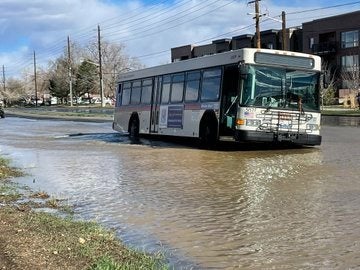Bus gets stuck in sinkhole on flooded Colorado road
All passengers evacuated from vehicle without any injuries

Your support helps us to tell the story
From reproductive rights to climate change to Big Tech, The Independent is on the ground when the story is developing. Whether it's investigating the financials of Elon Musk's pro-Trump PAC or producing our latest documentary, 'The A Word', which shines a light on the American women fighting for reproductive rights, we know how important it is to parse out the facts from the messaging.
At such a critical moment in US history, we need reporters on the ground. Your donation allows us to keep sending journalists to speak to both sides of the story.
The Independent is trusted by Americans across the entire political spectrum. And unlike many other quality news outlets, we choose not to lock Americans out of our reporting and analysis with paywalls. We believe quality journalism should be available to everyone, paid for by those who can afford it.
Your support makes all the difference.A bus fell into a sinkhole as it was driven through a flooded road in Colorado, police say.
The vehicle became trapped at it was making its way throughthe city of Boulder, according to authorities.
Police say the incident took place at around 4.30pm on Wednesday and forced them to close westbound Arapahoe at 55th Street in the university town. All of the passengers on the bus were evacuated and no injuries were reported.
Police tweeted that the bus, which was in the middle of the road, was “actively sinking.”
The Regional Transit District said that a fire hydrant had been pouring water into the road and the driver could not tell there was damage and drove through it.
It is not known yet what caused the sinkhole and police have not said how long the road will be closed, according to FOX31.
The bus was eventually pulled out of the sinkhole, with water service in the area impacted for hours.
“Sinkholes are depressions in the ground surface. They are caused when voids in the subsurface get large enough that the overlying material can no longer support its own weight and collapses into the void,” states the Colorado Department of Transportation.
“The void can be caused by groundwater dissolving and removing material, erosion around drainage features, and (most frequently in Colorado) mining operations. The Geohazard Program performs emergency investigations when sinkholes begin to develop to determine the size and extent of the sinkhole.”
A recent study conducted in Florida revealed that climate change has led to an increase in sinkhole collapses over the past 50 years. The state has had among the highest number of sinkholes in the world - more than 2,800 since 1950.
The study found that for every 0.1C rise in global temperature, the number of sinkholes increased between 1 and 3 per cent. Increases in extreme weather are likely to exacerbate the problem.

Join our commenting forum
Join thought-provoking conversations, follow other Independent readers and see their replies
Comments